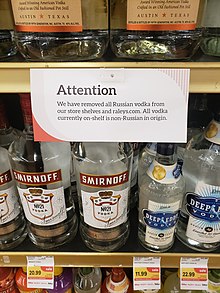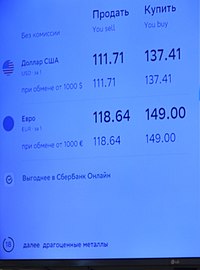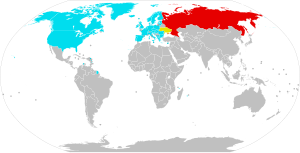
A | B | C | D | E | F | G | H | CH | I | J | K | L | M | N | O | P | Q | R | S | T | U | V | W | X | Y | Z | 0 | 1 | 2 | 3 | 4 | 5 | 6 | 7 | 8 | 9

The economic impact of the Russian invasion of Ukraine began in late February 2022, in the days after Russia recognized two breakaway Ukrainian republics and launched an invasion of Ukraine. The subsequent economic sanctions have targeted large parts of the Russian economy, Russian oligarchs, and members of the Russian government.[1][2][3][4] Russia responded in kind. A wave of protests and strikes occurred across Europe against the rising cost of living.[5]
The war in Ukraine has also resulted in significant loss of human capital,[6] destruction of agricultural trading infrastructure,[7] huge damage to production capacity,[8] including through the loss of electricity,[9][10] and a reduction in private consumption of more than a third relative to pre-war levels.[11]
Background
Beginning in 2014, Russia has been facing sanctions over its annexation of Crimea which have stunted the nation's economic growth.[12][13][14][15][16] In 2020, the COVID-19 recession[17][18][19][20] and the oil price war with Saudi Arabia also affected the Russian economy. Additional sanctions occurred in the lead-up to the invasion in 2021.[21][22] The Russian stock market declined by twenty percent during the military buildup.[23]
History of economic impact

Kristalina Georgieva, the managing director of the International Monetary Fund (IMF), warned that the conflict posed a substantial economic risk for the region and internationally. She added that the IMF could help other countries impacted by the conflict, complementary to a $2.2 billion loan package being prepared to assist Ukraine. David Malpass, the president of the World Bank Group, said that the conflict would have far-reaching economic and social effects, and reported that the bank was preparing options for significant economic and fiscal support to Ukrainians and the region.[25]
Despite unprecedented international sanctions against Russia, payments for energy and raw materials were largely spared from these measures, as were food supplies because of the potential impact on world food prices. Russia and Ukraine are major producers of wheat that is exported through the Bosporus to Mediterranean and North African countries.[26][27] The expulsion of some Russian banks from SWIFT is expected to affect the country's exports.[28] Since Russia is the largest trading and economic partner for post-Soviet states in Central Asia and a major destination for millions of CIS's migrant workers,[29] Central Asia has been particularly hard hit by sanctions against Russia.[30][31]
Sanctions also included asset freezes on the Russian Central Bank,[32] which holds $630 billion in foreign-exchange reserves,[33] to prevent it from offsetting the impact of sanctions.[34] On 5 May, President of the European Council Charles Michel said: "I am absolutely convinced that this is extremely important not only to freeze assets but also to make possible to confiscate it, to make it available for the rebuilding of Ukraine".[35]
Russia

Economic sanctions affected Russia from the first day of the invasion, with the stock market falling by up to 39% (RTS Index). The Russian ruble fell to record lows, as Russians rushed to exchange currency.[36][37][38] Stock exchanges in Moscow and St. Petersburg were suspended until at least 18 March,[39] making it the longest closure in Russia's history.[40] On 26 February, S&P Global Ratings downgraded the Russian government's credit rating to "junk", causing funds that require investment-grade bonds to dump Russian debt, making further borrowing very difficult for Russia.[41]
The Central Bank of Russia announced interventions, its first since the 2014 annexation of Crimea, to stabilise the market.[42] On 28 February, it raised interest rates to 20% and banned foreigners from selling local securities.[43] According to a former deputy chairman of the Russian central bank, the sanctions put the Russian National Wealth Fund at risk of disappearing.[44] With the value of the Russian ruble and the share prices for Russian equities falling on major exchanges, the Moscow Exchange was closed for a day, which was afterwards extended to over a week.[45][46] As of 28 February, the price of Russia's credit default swaps signalled about a 56% chance of default.[47] Fitch Ratings feared that Russia would imminently default on its debts.[48]

On 27 February, BP, one of the world's seven largest oil and gas companies and the single largest foreign investor in Russia, announced it was divesting from Rosneft.[49] The Rosneft interest comprised about half of BP's oil and gas reserves and a third of its production. The divestment was projected to cost the company up to $25 billion, and analysts noted that it was unlikely that BP would be able to recover anywhere near the value of Rosneft.[50] The same day, the Government Pension Fund of Norway, the world's largest sovereign wealth fund, announced that it would divest itself from its Russian assets. The fund owned about 25 billion Norwegian krone ($2.83 billion) in Russian company shares and government bonds.[51]
On 28 February, Shell also announced that it would be pulling its investments in Russia.[52] On 1 March, the Italian energy company Eni announced that it would cancel its investments into the Blue Stream pipeline.[53] The same day, the world's largest shipping companies, Maersk and Mediterranean Shipping Company, suspended all container shipments to Russia, excluding foodstuffs, medical, and humanitarian supplies.[54][55]
Russia is reportedly experiencing brain drain due to mass emigration of more than 300,000 mainly younger Russians,[56] many of whom are tech industry professionals, to countries like Armenia, Georgia, and Turkey.[57][58] More than 50,000 Russian information technology specialists have left Russia.[59] In response to sanctions in the entertainment industry, Russia is considering the legalisation of software piracy.[60]
Cyberattacks by unidentified global hackers have also been a problem for Russia. For example, a hacking of the Russian Federal Air Transport Agency, Rosaviatsia, in late March 2022 resulted in massive disruption and the agency switching back to the use of paper document flow and postal mail.[61] Due to budget limitations, Rosaviatsia did not have the necessary backups of the hacked data.[62]
On 11 April, Russian Railways defaulted on 268 million dollars of bonds after failing to make payments on a Swiss franc bond.[63]
In late July 2022, the IMF upgraded Russia's GDP estimate by 2.5%, but some economists see a long-term problem for the Russian economy, and explain its resilience only by a short-term increase of energy prices. Russia was able to leverage its economic power by cutting gas supplies to Europe, and play up its agricultural might as the largest wheat exporter globally. By August 2022, Russia was selling almost as much oil as before its invasion of Ukraine. Sales to the Middle East and Asia helped make up for declining exports to Europe, and due to the higher price, Moscow revenues were $20 billion monthly compared to $14.6 billion a year before (2021).[64]
Despite international sanctions during the Russo-Ukrainian War, Russian energy sales have increased in value, and its exports have expanded with new financing options and payment methods for international buyers.[65][66] At the same time, the Russian budget had a record deficit of 1.45 trillion rubles by August, mostly due to collapse of tax income from fossil fuel exports from 70 billion down to 33.7 billion rubles per month, with total reduction of monthly budget incomes by 10%.[67][68] In September, the Russian Ministry of Finance notified all public sectors of a reduction in spending by 10%.[69]
Some estimates suggest that reconstruction of the war-torn annexed territories would cost Russia between $100 and $200 billion.[70] The reconstruction of Mariupol alone will likely cost more than $14 billion. A state budget published on 29 September by the Kremlin revealed that 3.3 billion roubles (about US$59 million) had been set aside to rebuild the regions.[71]
In November 2022 it was reported that Russia had officially entered a recession as the Federal State Statistics Service had reported a national GDP loss for the second consecutive quarter.[72]
According to most estimates, every day of the war in Ukraine costs Russia $500 million to $1 billion.[73][74][75][76]
Russia faced a record shortage of factory workers in July 2023, with more than 43% of industrial enterprises facing a shortage, up from 35% in April.[77]
Zdroj:https://en.wikipedia.org?pojem=Economic_impact_of_the_2022_Russian_invasion_of_Ukraine
Text je dostupný za podmienok Creative Commons Attribution/Share-Alike License 3.0 Unported; prípadne za ďalších podmienok. Podrobnejšie informácie nájdete na stránke Podmienky použitia.
Antropológia
Aplikované vedy
Bibliometria
Dejiny vedy
Encyklopédie
Filozofia vedy
Forenzné vedy
Humanitné vedy
Knižničná veda
Kryogenika
Kryptológia
Kulturológia
Literárna veda
Medzidisciplinárne oblasti
Metódy kvantitatívnej analýzy
Metavedy
Metodika
Text je dostupný za podmienok Creative
Commons Attribution/Share-Alike License 3.0 Unported; prípadne za ďalších
podmienok.
Podrobnejšie informácie nájdete na stránke Podmienky
použitia.
www.astronomia.sk | www.biologia.sk | www.botanika.sk | www.dejiny.sk | www.economy.sk | www.elektrotechnika.sk | www.estetika.sk | www.farmakologia.sk | www.filozofia.sk | Fyzika | www.futurologia.sk | www.genetika.sk | www.chemia.sk | www.lingvistika.sk | www.politologia.sk | www.psychologia.sk | www.sexuologia.sk | www.sociologia.sk | www.veda.sk I www.zoologia.sk
